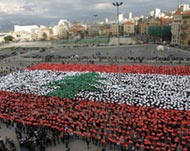Hezbollah calls for street action
Hezbollah and its allies will stage street protests to press their demands after the collapse of Lebanon’s all-party talks.

The call for demonstrations on Sunday came after five Shia Muslim ministers in Lebanon‘s cabinet resigned after talks on forming a government of national unity failed.
Sheikh Naim Kassem, the deputy secretary-general of Hezbollah, said: “This was a first step. There will be other steps that we will discuss in detail with our allies and which we will announce gradually.”
He said the talks had failed because anti-Syrian majority leaders had refused to allow others effective participation in running the country.
“The parliamentary majority camp foiled the dialogue because they don’t want widescale Lebanese participation in government, and they want to monopolise decisions in this country. This is something that we … can’t be witnesses to,” Kassem said.
Anti-Syrian leaders have pledged counter-demonstrations should Hezbollah take the political crisis to the streets, raising fears of confrontations and violence at a time of rising tension between Sunnis and Shia.
Resignations
Mohammed Raad, the head of the group’s parliamentary bloc, said: “We have resigned because the majority insists on exercising power on its own.
“We don’t want ministers who blindly follow the majority.
“This is about giving a warning to the majority.”
Fuad Siniora, Lebanon‘s prime minister, refused to accept the resignations.
A statement from his office said: “Mr Siniora rejects the resignation of Hezbollah and Amal ministers even if they officially hand in their resignation and insists they take part in government.”
More seats
Hezbollah’s seeks more cabinet seats for itself and its Christian ally, the Free Patriotic Movement (FPM). In particular, the Hezbollah-Amal-FPM alliance wants a third of all cabinet seats, which would give it a veto on cabinet decisions.
Michel Aoun, leader of the FPM, said on Saturday: “We did not reach a result today and the session was ended without setting a date for a new session.”
Other politicians played down the break-up of the talks.
Samir Geagea, a Christian politician, acknowledged that they had failed to reach an agreement but suggested the talks would resume at a later stage.
He said: “We want to continue consultations until the last minute.”
Geagea said the meeting was stopped partly because Nabih Berri, the parliament speaker, was scheduled to leave for Iran.
Hezbollah wants greater representation for itself and its allies in the ruling coalition, which is currently dominated by parties opposed to Syria‘s interference in Lebanese politics.
Rafiq al-Hariri
The handover to the Lebanese government of a draft document setting up an international tribunal to try suspects in the 2005 assassination of Rafiq al-Hariri, a former prime minister, dominated the agenda of Saturday’s meeting.
 |
|
The death of Rafiq al-Hariri |
Lebanese media reports had suggested that the anti-Syrian parliamentary majority, led by Saad al-Hariri, Rafiq al-Hariri’s son, would agree to give Hezbollah and its allies a larger share of the cabinet and effective veto power over key decisions if the group and allied pro-Syrian factions endorsed the tribunal document.
But Saad al-Hariri’s allies denied that such a deal had been considered.
International tribunal
Marwan Hamadeh, the telecommunications minister and an ally of Saad al-Hariri, said: “The international tribunal is a moral – not political issue and Rafiq Hariri’s blood will not be sold on any negotiating table.”
Hariri died, along with 22 other people, when a suicide truck bomb exploded in February 2005. The killing sparked huge anti-Syrian protests in Beirut and led to the withdrawal of Syrian troops from Lebanon after 29 years. Elections after the killing created an anti-Syrian majority in the parliament and cabinet.
The UN investigation has implicated top Syrian officials, but they have denied any role in the assassination. Pro-Syrian politicians have claimed that Damascus was being targeted for opposing US policies in the Middle East.
Four Lebanese generals, top pro-Syrian security chiefs under Emile Lahoud, the Lebanese president, have been under arrest for 14 months, accused of involvement in the murder.